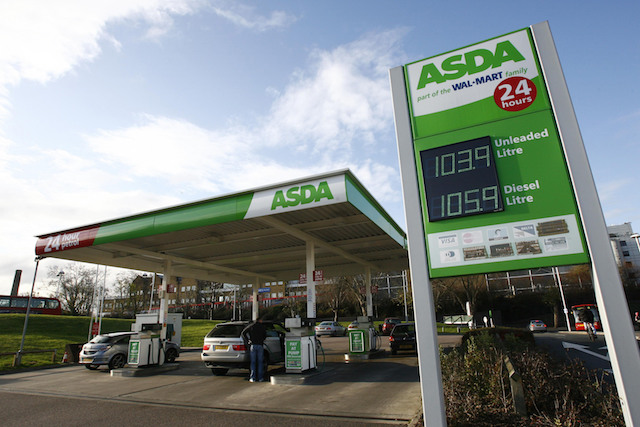
After four months of record price rises, the cost of filling up your car is set to fall from tomorrow as Asda has announced that it is lowering the cost of fuel at its stations from tomorrow.
PetrolPrices.com, the fuel price information app which compares prices from 8,440 petrol stations daily, predicts that a supermarket petrol price war could kick off in the coming days as the supermarkets start to compete on price, following falls in oils prices by 5% in the past week.
Effective from June 6th, Asda will drop prices at 322 petrol stations after the supermarket announced a cut of up to 3ppl off diesel and 1ppl off unleaded, following decreases in the wholesale cost.
Oil prices have dropped thanks to an increase in reserves in the USA, leading to hopes for lower pump prices in the coming weeks. At the highest point in the last month, oil sat at $72 a barrel, so the drop to $67 is considerable and drastic. It’s the steepest drop in six months.
Up until to today, petrol prices had risen for four months to over 130.57 per litre, which has been the longest run of increases since 2016. Petrol became 11p a litre more expensive between the beginning of February and the end of May, while diesel was up 7p a litre over the same period to 135.54 . This represented the second highest price rise since 2000, with May 2018 being the highest, and it comes as retailers pass on wholesale price increases to customers after the cost of oil increased by more than $3 a barrel.
Says Kitty Bates, consumer spokesperson at fuel information service PetrolPrices.com: “The news of supermarkets starting to drop prices is no doubt a good thing for motorists who have been suffering from price rises for four months now. We would expect to see other supermarkets follow suit over the next couple of days as they start to compete on price, with independent retailers following this once they have sold through their existing stock. There’s considerable scope for prices to continue to drop, as oil prices have fallen drastically in the past few days and we would expect them to either level out or potentially fall even further. The coming weeks will hopefully see some considerable relief for motorists and drivers, how should keep an eye on PetrolPrices.com app to check for price changes in their area.”
It is expected that the full effect of the price drop won’t be felt across all UK stations for a couple of weeks, as petrol retailers will need to sell through their existing stock, which will have been purchased at the higher price. When the price of a barrel of oil goes up or down it can take up to a month for the changes to be felt at the pumps, depending on the volume of fuel sold. The quicker retailers can sell fuel the quicker they can respond to price changes. If demand at the forecourt is low then prices will drop slowly. Supermarkets tend to be able to respond more quickly than smaller stations due to holding their petrol stock centrally.
Kitty Bates, adds: “Oil prices have risen drastically in the past few months but thanks to some external geopolitical factors, as of the beginning of June a barrel of oil is sitting at the $62 mark, almost $10 less than last month. The changes are being driven geopolitical instances and the trade war between China and America has actually helped to lower oil prices. This will be passed on to the motorist over the coming weeks, and as the hotter weather arrives, families across Britain will be able to enjoy a road trip without putting a huge dent in their income. However, it is expected the drop will not be long-term proposition, as sanctions placed on Iran by America could see much higher pump prices towards the end of the year.”
Many things affect the oil price, from the obvious supply and demand, as in winter demand increases across Europe for heating fuel, to the geopolitical influences such as tensions in the Middle East, trade wars between America and China, America’s sanctions on Middle Eastern countries, such as Iran, and Brexit. Once the barrel of oil is bought, it is then fractionally distilled and then sold on the wholesale market for companies to buy. Quieter forecourts, or ones with less thoroughfare, will be slower to respond to pump price changes as they cannot buy wholesale fuel as quickly. This is why many local supermarket forecourts change their prices quicker than a small independent garage, as the supermarkets prices are controlled centrally rather than locally.






